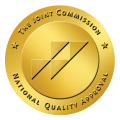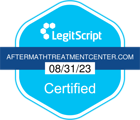It can tear someone apart watching a loved one battle addiction. What’s possibly more heartbreaking is when they won’t acknowledge they have a problem or that they need addiction treatment. There’s still hope, though. By understanding what denial truly is, how it feeds into addiction, and what works when confronting it, you can help guide your loved one toward a healthier tomorrow.
Denial in Addiction: Rejecting Reality

While denial might look like straight-up lying, think of it as a shield or defense mechanism used to try and avoid pain. When someone’s trapped in denial, their behaviors and thought patterns typically stem from raw fear. They’re desperately trying to dodge feelings of shame, guilt, criticism, and self-loathing.
So, instead of facing facts, they construct an alternate reality. This shows up differently:
- Downplaying other people’s concerns
- Showing entitlement to keep using drugs or alcohol
- Lying to themselves even when shown evidence of their addiction
- Acting like you’re being dramatic when you express worry
- Deflecting when confronted about their substance use
A common response involves rationalizing or excusing their addictive behaviors. They might tell you they’re drinking more because work is brutal right now, or because they’re going through a rough patch. Classic justifications they may give:
- “I can quit whenever I want to.”
- “I’m just trying to blow off some steam and have fun.”
- “It’s not like I’m hurting anybody but myself.”
- “You’d be using too if you dealt with what I deal with.”
- “My doctor prescribes these; it’s not like I’m buying street drugs.”
- “Now just isn’t the right moment to quit.”
This rejection of reality becomes incredibly dangerous, especially for those dealing with denial of substance abuse. Save addressing these patterns for later conversations with a counselor or professional interventionist who can guide the discussion productively.
What Makes Denial So Dangerous?
Because denial warps reality, it prevents people from tackling the real source of their fear or pain head-on. The longer your loved one stays in denial about their addiction, the longer they’ll keep turning to substances as an escape hatch from what’s really tormenting them.
To help them, you need to grasp how denial enables addiction to thrive. Every time they minimize their problem, justify their substance abuse, or brush off consequences, they:
1. Suppress Their Own Self-Efficacy
Self-efficacy means believing in your ability to handle challenges and get things done. Denial crushes self-efficacy by creating fear around facing difficulties. When your loved one denies their addiction, they’re subconsciously saying, “I can’t cope with this without chemical help.” This untrue belief pattern feeds their addiction and keeps them from reaching out for real help.
2. Continue to Self-Medicate Their Problem

Without healthy self-efficacy, your family member will likely keep using drugs and alcohol to numb the issues driving their addiction. This self-medication approach is a dangerous trap that both triggers and perpetuates addiction. Unfortunately, self-medicating tends to multiply problems rather than solve them.
3. Create Multiple Problems
Refusing to face reality compounds problems. Turning to substances instead of dealing with a troubling situation honestly skyrockets stress levels, increasing the risk of physical and mental health crises. The worst-case consequences can include marriage breakdown, job loss, legal troubles, financial collapse, chronic health conditions, and ending up on the streets.
But there’s light at the end of this tunnel—You have several powerful ways to help a family member with an addiction break through their denial and accept help.
Practical Ways to Help an Addicted Family Member in Denial
As natural as it might be to try to prove your loved one wrong, that’s usually not the healthiest path to pursue. Even though you may have a right to be angry, lead with love and legitimate concern. Know that when you approach them about their substance abuse, they will likely be defensive.
You may be able to help ease their defensiveness with a few practical approaches:
1. Be Honest About Challenges You’re Facing or Have Faced

Addiction often grows from a deep-seated fear of being judged or seen as a “bad person.” Learning how to help someone in denial requires understanding and patience. When your loved one is sober, have an honest conversation with them. During this, avoid talking about their substance use and rather:
- Ask how they’re doing
- Ask what’s going on in their life, about their family or work
- Listen attentively
- Don’t interrupt them
- Avoid giving unsolicited advice
- Acknowledge their feelings
2. Tell Your Loved One How You Overcome Challenges
If they seem unwilling to open up, tell them about stressful moments you’ve been through or things that cause you anxiety. It’s important to highlight how you overcame these. If applicable, be upfront about any struggles you’ve had with addiction in the past.
The goal isn’t to compare struggles but to build trust. If you’re authentic with them, they’ll be more likely to be comfortable, open, and honest. Hearing that someone they care about has triumphed over adversity can inspire them to believe they can do the same.
3. Encourage Your Loved One to See a Counselor
If you can get your loved one to open up, encourage them to seek help from a counselor or therapist. Offer to go with them to the first appointment to help ease any stress. If you’ve personally benefited from working with a mental health professional, share your positive experiences. Remind them that therapy is a safe, non-judgmental space to work through deep-seated issues.
A good therapist can provide your loved one with essential support in several ways:
- Processing difficult emotions and experiences
- Developing healthy coping strategies
- Improving overall mental health
- Resolving internal conflicts
- Accepting the reality of their situation
Addressing the root causes of their addiction through professional help can be a critical step in overcoming denial and sustaining long-term recovery.
4. Agree to Attend a Self-Help Meeting With Your Loved One

If your loved one is hesitant to see a counselor, suggest attending a support group meeting together. These gatherings can feel less formal and intimidating, and allow your loved one to participate without committing to a full treatment program.
Highlight the space is judgment-free, and they can feel safe opening up. Attending a meeting with you for moral support may help them feel more comfortable taking that first step. Support group meetings like those for Alcoholics Anonymous (AA) or Narcotics Anonymous (NA) can provide your loved one with important benefits:
- Acknowledge they have a problem
- Realize they are not alone in their struggles
- Learn practical coping skills for managing cravings
- Receive empathetic encouragement from others in recovery
- Connect with a community working towards sobriety
- See real-life examples of people overcoming addiction
5. Stage an Intervention
If you’ve exhausted other options with no success, it may be time to consider an intervention. This is an organized meeting to confront your loved one about their substance abuse in a structured way. Interventions can be emotionally intense, but they’ve proven highly effective. During the intervention:
- Gather with family/friends to express your concerns
- Provide specific examples of their problematic behaviors
- Offer a pre-curated treatment plan with clear next steps
- Emphasize that you’re coming from a place of love and support, not judgment
- Explain the boundaries and consequences if they refuse to get help
The goal is to make it impossible for your loved one to continue to deny how serious their situation is. With a solid plan in place and the support of those who care about them most, they may finally be compelled to accept the help they need.
6. Pursue Involuntary Commitment
If all else fails, involuntary commitment is a last resort. This established process can enable the placement of your family member into a supervised treatment facility when they can’t make this choice independently. This provides structured rehabilitation support.
Make sure to check the regulations around this approach in your specific state. For instance, involuntary commitment is legal in Massachusetts but is not recommended as a primary method. Research indicates recovery outcomes tend to be stronger when individuals have internal motivation to participate in treatment. However, where your loved one faces immediate health risks, this approach could be the most effective way to ensure crucial care.
How to Help a Drug-Addicted Family Member

Seeing a family member resist acknowledging substance use issues brings emotional pain and worry. By understanding denial patterns, keeping open communication, sharing personal challenges, and promoting counseling services, you can help them move toward acceptance. Additional methods include an expert-led intervention or mandated treatment. Whichever option, there are addiction treatment centers, like Aftermath Treatment Center, to help you guide your loved one to a healthier future.







